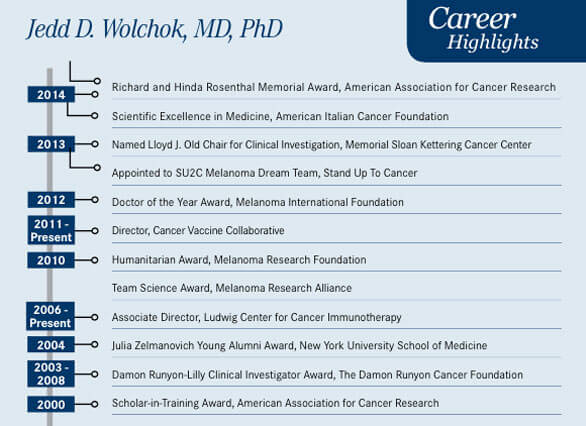Immunotherapy Innovator Jedd Wolchok Honored
Source:Onclive, April 2015

Source: OncLive
Before the Internet and global interconnectedness, advancements in science and medicine were usually slow and incremental, with research and findings conducted by solo researchers and shared over time.
“The idea of team science is something that evolved quite a lot in the past few years. It used to be that this idea of large groups was more uncommon than it is now. It has become quite the norm to assemble large groups to solve problems more quickly, and I’m all for it,” said Jedd D. Wolchok, MD, PhD, the recipient of the 2014 Melanoma Giants of Cancer Care® award. Wolchok is chief, Melanoma and Immunotherapeutics Service, and Lloyd J. Old Chair for Clinical Investigation at the Memorial Sloan Kettering Cancer Center in New York City.
The collaborative effort, in which all the researchers involved play a role to accomplish a common goal, can only succeed with a keen understanding of interpersonal dynamics. For Wolchok, this kind of group dynamic is well demonstrated in a favorite book, American Prometheus, the classic biography of J. Robert Oppenheimer written by Martin J. Sherwin and Kai Bird. The coming together of colleagues from multiple disciplines toward a vital and common goal was evident in the Manhattan Project and subsequently in the efforts to find more peaceful and controlled applications of the atomic science.
Once a group comes together, good decisions can be made based on logic, reasoning, and instinct, with the good of a group sharply in focus. Approaching problems analytically, logically, and with calmness has gotten Wolchok this far—and for patients with melanoma that is quite far indeed.
Wolchok is among the team of scientists who are developing anticancer strategies aimed at manipulating the body’s immune checkpoints, thus promoting a more robust activation of T cell responses to cancerous cells. He served as the principal investigator on the pivotal clinical trial that led to the FDA’s 2011 approval of ipilimumab (Yervoy), an anti-CTLA-4 monoclonal antibody that is the first agent to employ the immune checkpoint blockade strategy in any tumor type.
Summers at Memorial Sloan Kettering
The death of a loved one is often the inspiration for a budding scientist to pursue a career in cancer research. In Wolchok’s case, the death was his grandmother’s—she had pancreatic cancer—but his passion for research was gradual, fueled by the summers away from Princeton University, where he completed his undergraduate studies.
“By the time I finished college, the research experiences I had during summer breaks while working at Memorial Sloan Kettering in the translational laboratories fueled my interest,” said Wolchok. “I saw incredible possibilities that existed in terms of moving research from the laboratory to the clinic, and taking those successes and failures back to the laboratory for refinement. That was a very inspiring set of experiences for me.”
Wolchok was mentored by Lloyd J. Old, MD, considered the father of modern tumor immunology, and Alan N. Houghton, MD. The Houghton Laboratory brings together a mix of molecular biologists, immunologists, medical oncologists, and surgeons. The participants understand that this type of environment encourages cross-fertilization of scientists and clinical investigators. The laboratory, which Wolchok now heads, is interested in two fundamental questions: “How does the immune system recognize cancer, particularly mutations?” and, “How does the immune system reject cancer?”

Unraveling the Response Puzzle
Wolchok considers it an incredible honor to continue his mentors’ work, although he would much rather have Houghton actively engaged in the ongoing research. Houghton suffers from amyotrophic lateral sclerosis and Lloyd Old died from prostate cancer in 2011.
Persistence in Immunotherapy Research
Until about three years ago, there were no medications that improved survival in patients with metastatic melanoma. Immunotherapies were considered complicated and marginal. They were only administered at a few cancer centers. In addition, immunotherapy’s low success rate and low tolerability, with only otherwise healthy patients as candidates, made it a difficult clinical treatment to pursue.
“I think one had to be persistent in both immunotherapy and in melanoma treatment because there was so much failure until recently,” said Wolchok. “There were so many trials that did not meet expectations. There was so much questioning of the validity of the underlying science because of that.” But he pointed out that persistence in this field has paid off. Researchers stuck with it until agents were developed that could modulate the immune system in a potent enough manner to impact tumor growth.
